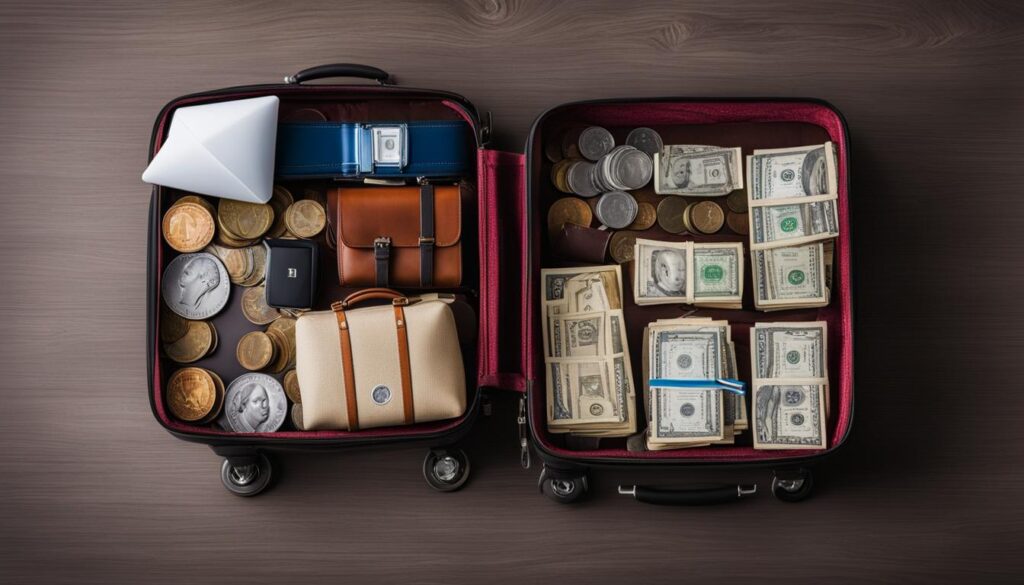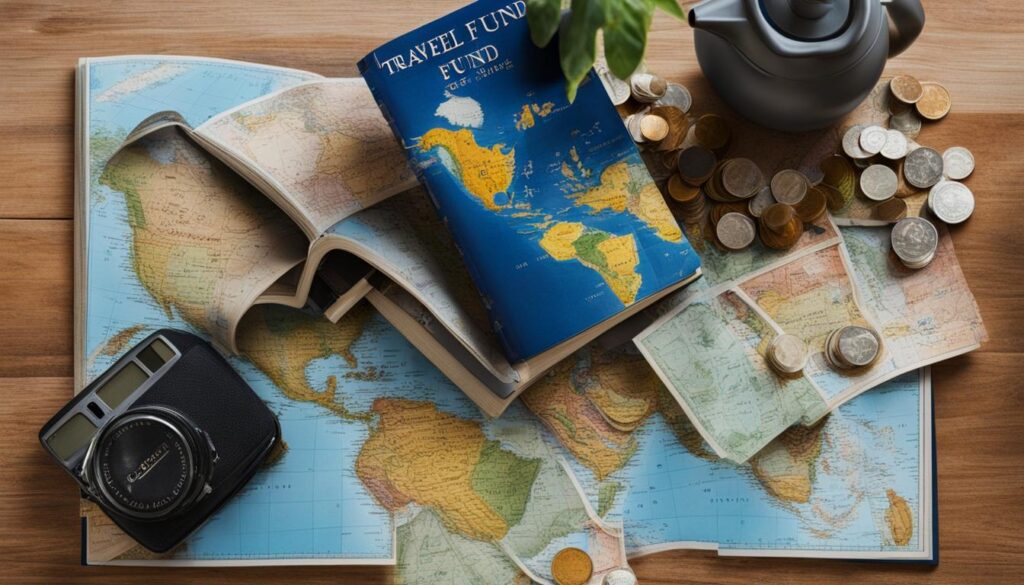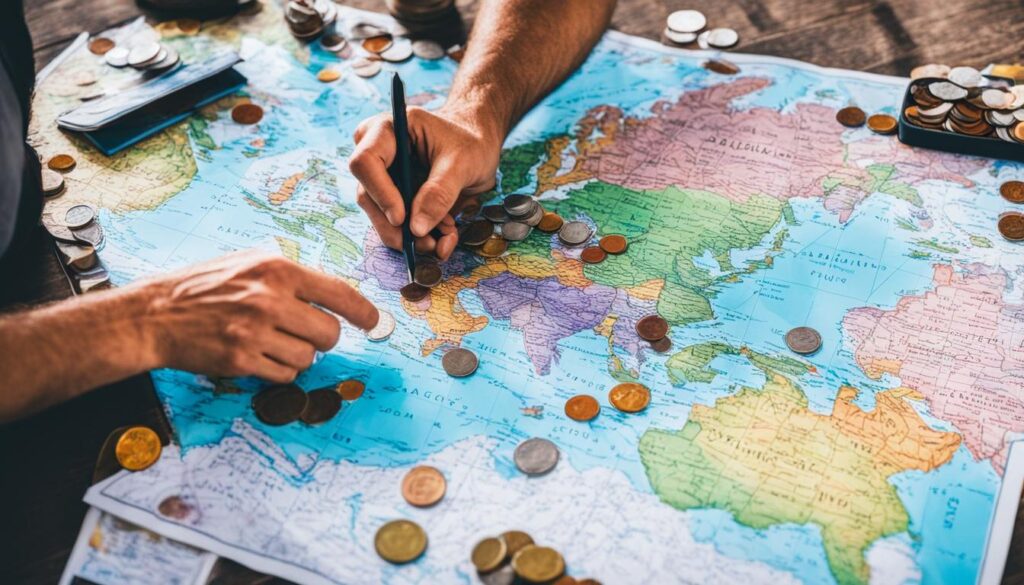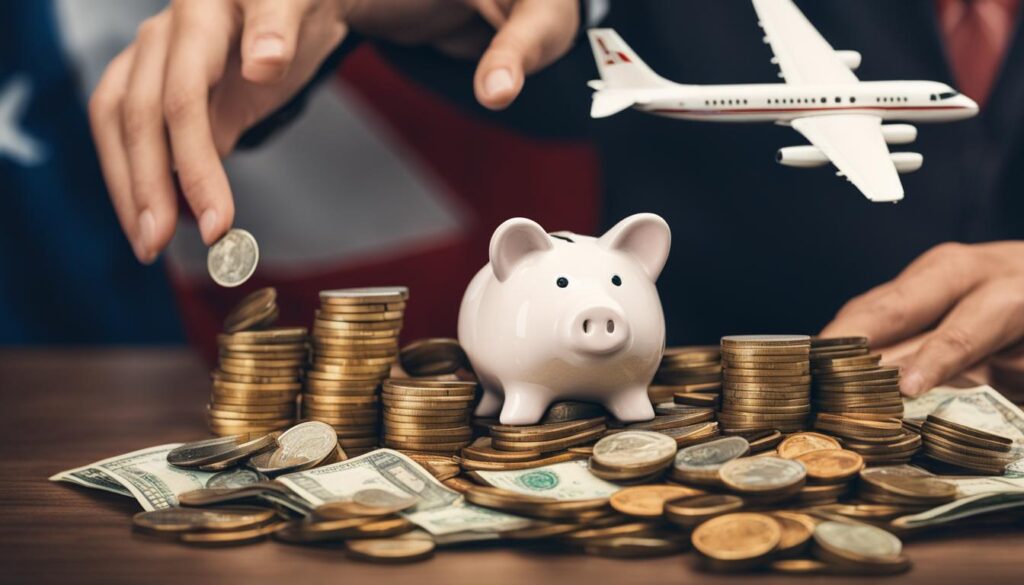If you have been dreaming of traveling long-term but are worried about the expenses, you have come to the right place. Budgeting for long-term travel doesn’t have to be a daunting task. With some smart tips and tricks, you can stretch your funds and explore the world without breaking the bank.
In this article, we will walk you through the process of creating a comprehensive travel budget, setting realistic financial goals, researching destination costs, and managing your expenses while on the road. By the end of this article, you will be ready to embark on your long-term travel adventure with confidence.
Whether you are planning to travel for a few months or a year, our budgeting tips and tricks will help you make the most of your trip without putting too much strain on your finances. So let’s get started and explore the world without worrying about the costs.
Planning Your Long-Term Travel Budget
Long-term travel can be a life-changing experience, but it’s crucial to plan your budget carefully before embarking on your journey. Creating a comprehensive travel budget will help you stay financially prepared and avoid unexpected expenses.
Your long-term travel budget should include all of your expenses, both before and during your trip. This includes transportation, accommodation, food, activities, and any additional expenses you may encounter. To start planning your budget, follow these steps:
- Research your destinations and estimate their costs
- List all of your expenses and prioritize them
- Determine your available funds and savings
- Calculate your estimated travel costs and adjust your budget
By planning your budget carefully and knowing your spending limits, you can make your long-term travel adventure a reality. One useful tool is a travel budget calculator, which can help you estimate your expenses and create a realistic budget.
Planning Your Accommodation Budget
Accommodation is one of the most significant expenses during long-term travel. To make your budget stretch further, consider alternative options to traditional hotels like hostels, homestays, or vacation rentals. You can also look for affordable accommodation outside of popular tourist areas.
| Accommodation Type | Average Nightly Cost |
|---|---|
| Hostel Dormitory | $15-$40 USD |
| Private Hostel Room | $30-$80 USD |
| Homestay | $20-$100 USD |
| Vacation Rental | $50-$200 USD |
Remember to read reviews and compare prices to ensure that you’re getting the best value for your money.
Setting Realistic Financial Goals
To achieve long-term travel goals that are realistic and sustainable, it is essential to set financial goals. These goals will guide you in determining how much money you need to save, how to prioritize your expenses, and how to allocate your resources effectively. Here are some budgeting strategies for long-term travel and saving for travel:
“The first step to accomplishing anything requires setting a goal.” – J.C. Ryle
Cut Expenses
One of the best ways to save money for travel is to cut your expenses. Take a close look at your monthly budget and identify areas where you can reduce your spending. It may require some sacrifices, but cutting back on non-essentials, such as dining out, shopping, or subscription services, can yield significant savings over time. Small changes, like making coffee at home instead of buying it, can add up.
Increase Income
Another way to save money for travel is to increase your income. Consider taking on a side hustle or a part-time job, selling unused items online, or freelancing. These additional revenue streams can help you reach your travel savings goal faster and make your long-term travel dreams a reality.
Prioritize Your Travel Savings
Prioritizing your travel savings means that you commit to putting a portion of your income into savings each month. Consider setting up a separate bank account designated exclusively for your travel fund. Automate transfers to this account each month, to ensure you do not forget. Prioritizing your travel savings will help you stay on track when budgeting for long-term travel, while also providing you with peace of mind that you are working towards this goal.
Researching Destination Costs
When it comes to travel budget planning for long-term vacations, it is imperative to research your intended destination’s costs thoroughly. By doing so, you will be able to create a budget that ensures your long-term travel budget lasts longer and is less stressful. Accommodation, transportation, food, activities, and any other expenses are all essential factors to consider.
The easiest and most convenient way to ascertain destination costs is through online research. You can check prices for hotels, airbnbs, and other lodging options, along with the cost of food and activities, by browsing travel blogs, websites, hotel aggregators, or online tour operators. Consider your preferred means of travel as well and do some research to find the most affordable options.
Consider Alternative Accommodation
Travel budget planning for long-term travel requires you to prioritize affordable accommodation options. Consider hostels, home-stays, couch-surfing, or sharing accommodations with other travelers to save on lodging. These alternatives allow you to explore a long-term travel budget without compromising your comfort.
| Accommodation Type | Average Cost Per Night (USD)* |
|---|---|
| Budget Hotel | 50-70 |
| Hostel | 15-25 |
| Airbnb | 40-80 |
| Home-stay | 20-30 |
*Estimated costs for accommodation in popular travel destinations. Actual costs may vary based on location and season.
Research Public Transportation
When budgeting for transportation, aim to use public transport whenever possible to save money. Take advantage of the city’s metro, buses, or trams, and don’t forget to research transportation options to your destination to avoid expensive last-minute purchases.
Try Local Food and Markets
Eating on a budget doesn’t mean sacrificing quality. Finding affordable dining options can be as simple as visiting the local markets or trying the local street food. When browsing through menus, look for restaurants that serve reasonably-priced meals or offer lunch specials. You can consider self-catering as an option too, saving you money for other travel expenses.
Creating a Daily Spending Plan
When traveling long-term, sticking to a budget is essential to avoid overspending and running out of funds. Creating a daily spending plan can help you keep track of your expenses and manage your finances effectively. Here are some practical budget travel tips to create a daily spending plan:
1. Set a Daily Budget
Start by setting a daily budget that covers all your necessary expenses such as food, transportation, and accommodation. Consider the overall length of your trip and how much money you have available to spend each day. Stick to your budget as closely as possible to achieve long-term travel goals and priorities.
2. Track Your Expenses
Keep receipts and track your expenses throughout the day. At the end of each day, tally up your spending and compare it to your daily budget. This helps you identify where you might have overspent or areas where you can save more money.
3. Prioritize Your Spending
When making a daily spending plan, prioritize essential expenses, such as food and transportation. Allocate the remaining funds to either leisure activities or saving for future expenses. Doing so ensures you meet your basic needs while also getting the most out of your trip.
4. Use Mobile Apps and Online Tools
Many travelers use apps to create daily spending plans. Popular options include TravelSpend and Trail Wallet. These apps enable you to input and categorize expenses as you incur them. Moreover, they also allow you to view budget summaries and track expenses against your daily budget limit.
5. Carry Alternative Payment Methods
It’s important to carry alternative payment methods such as a credit card or debit card while traveling. This will help you manage your daily spending plan, in case you run out of cash or encounter unexpected expenses.
| Sample Daily Travel Budget Plan | Cost |
|---|---|
| Breakfast | $5 |
| Lunch | $10 |
| Dinner | $15 |
| Transportation | $10 |
| Activities | $20 |
| Accommodation | $30 |
| Total Daily Budget | $90 |
In conclusion, creating a daily spending plan is crucial when traveling long-term on a budget. Use these tips to create an effective spending plan that helps you manage expenses, prioritize spending, save money and stay on track with your long-term travel budget.
Travel Insurance and Emergency Funds
Planning for unexpected events is crucial when budgeting for long-term travel. Even the most meticulously planned journey can be disrupted by unforeseen circumstances like accidents, illnesses, or natural disasters. In these cases, travel insurance and emergency funds can provide financial protection and peace of mind, ensuring that you stay on track with your travel budget.
Before you embark on your long-term journey, research and compare travel insurance policy options to find one that fits your budget and offers comprehensive coverage for medical expenses, trip cancellations, and other emergencies.
| Insurance Provider | Policy Type | Cost (per month) | Coverage Details |
|---|---|---|---|
| World Nomads | Standard Plan | $130 | Emergency medical coverage up to $100,000, trip cancellation coverage up to $10,000, baggage and personal item coverage up to $3,000 |
| Allianz | Basic Plan | $80 | Emergency medical coverage up to $10,000, trip cancellation coverage up to $1,000, baggage delay and loss coverage up to $1,000 |
| IMG Global | iTravelInsured LX Plan | $180 | Emergency medical coverage up to $1,000,000, trip cancellation coverage up to 100% of trip cost, baggage and personal item coverage up to $2,500 |
In addition to travel insurance, you should also build an emergency fund that covers at least three to six months of living expenses. This fund can be used to cover unexpected costs like flight cancellations, medical emergencies, or lost or stolen items. When saving for travel, set aside a portion of your budget specifically for emergency funds, starting with a small amount and gradually increasing it over time.
Choosing Affordable Accommodation
Long-term travel can be expensive, and accommodation is a significant cost to consider. However, finding cheap lodging options is possible.
Consider alternatives to traditional hotels such as:
- Hostels: perfect for budget travelers who don’t mind sharing accommodations.
- Airbnb: ideal for those who prefer more privacy.
- Couchsurfing: for travelers looking for free accommodation and the chance to experience the local culture firsthand.
Another way to save money on lodging is by finding travel deals and discounts. Consider booking your accommodations in advance and taking advantage of off-peak travel periods.
Check websites such as Booking.com, Expedia, and Kayak for travel deals and discounts. Be sure to read and compare reviews before booking, as accommodation quality can vary widely.
When it comes to saving on accommodation costs, it pays to be resourceful and plan ahead. By considering alternatives to traditional hotels and taking advantage of travel deals and discounts, you can stay within your long-term travel budget.
Saving on Transportation Costs
Transportation costs can quickly add up during long-term travel. By following these budgeting strategies for long-term travel, you can minimize your expenses. Here are some money-saving tips to consider:
Utilize Public Transportation
Using public transportation like buses and trains is often much cheaper than renting a car or taking taxis. Additionally, many cities offer discounted public transportation passes for tourists, so be sure to look into this option when planning your trip. Not only will it save you money, but it can also help you see more of the local culture.
Book Flights on Budget Airlines
Booking with budget airlines offering lower fares can help you save on flight expenses. With a bit of flexibility and an open mind, flying for less is entirely possible. Keep in mind that budget airlines may have more restrictions on baggage and seat selection. It’s always a good idea to read the fine print and check what exactly is included in the fares you see.
Consider Alternative Modes of Travel
In some cases, travel by car or train can be cheaper than flying, depending on your destination, the distance, and your budget. Consider comparing the costs of different modes of transportation when planning your trip. Look into car rentals or even hitchhiking if it suits your preference. Factor in the cost of gas, tolls, and any parking fees, as well as the time spent traveling between destinations. Additionally, in some cities, cycling is a popular way to get around and reduces transportation costs even more.
“By choosing public transportation, budget airlines, and alternative modes of travel, you can significantly reduce your transportation expenses and better allocate your travel budget.”
Eating on a Budget
When you’re traveling on a tight budget, food expenses can quickly add up. Fortunately, there are plenty of ways to eat well while still sticking to your long-term travel budget. Here are some budget travel tips for eating on the road:
- Cook your meals: One of the easiest ways to save money on food is to cook your meals. Many hostels and guesthouses offer shared kitchens, making it easy to prepare your own food. Head to a local market and pick up some fresh produce and ingredients, and enjoy a homemade meal on the cheap.
- Explore local markets: Local markets are a great way to experience the local cuisine and taste new flavors, all while sticking to your budget. You’ll find plenty of affordable street food options and fresh produce to snack on throughout the day.
- Find affordable dining options: If you’re looking to eat out, there are still plenty of ways to find affordable dining options. Look for local eateries that offer hearty meals at reasonable prices, or search for food trucks and stalls that offer delicious meals for a fraction of the cost of a restaurant.
By following these budget travel tips, you can enjoy delicious meals without breaking the bank. Remember to plan ahead and make the most of local markets and shared kitchens, and you’ll be well on your way to eating well on a budget.
Managing Expenses on the Road
As you embark on your long-term travel adventure, managing your expenses effectively is essential for staying within your budget. Here are some practical budgeting strategies for long-term travel:
Track Your Spending
Keep an accurate record of your expenses to ensure you stay on track. Use a simple spreadsheet or a budgeting app to track your daily spending. By monitoring your expenditures, you can identify areas where you can save money and adjust your budget accordingly.
Prioritize Your Expenses
While budgeting for long-term travel, it’s crucial to prioritize your expenses. Ensure that you allocate funds for essential expenses, such as accommodation, transportation, and food. Don’t forget to include recreational expenses such as activities and events in your budget, but always prioritize your essential needs first.
Make Informed Financial Decisions
When making financial decisions during your travel, make sure you research your options to find the most cost-effective alternatives. Use resources such as online reviews, travel forums, and advice from other travelers to make informed decisions. Additionally, don’t be afraid to negotiate prices or ask for discounts when booking services, as it can save you considerable amounts of money in the long run.
“Successful long-term travel requires effective management of your finances. By monitoring your expenses, prioritizing your spending, and making informed financial decisions, you can stay within your budget and enjoy your journey with peace of mind.”
Conclusion
Congratulations! You have now learned smart tips and tricks for budgeting for long-term travel. By following the strategies outlined in this article, you can make your travel adventure both affordable and stress-free, allowing you to enjoy a longer journey without breaking the bank.
Remember to plan your budget comprehensively, set realistic financial goals, research your destination costs, create a daily spending plan, build an emergency fund, choose affordable accommodation and save on transportation and food expenses. Consistently tracking your spending and making informed financial decisions while on the road will help you stay within your travel budget.
Now, it’s time to start implementing these tips and embark on your long-term travel adventure with confidence! Have fun and safe travels!

















































